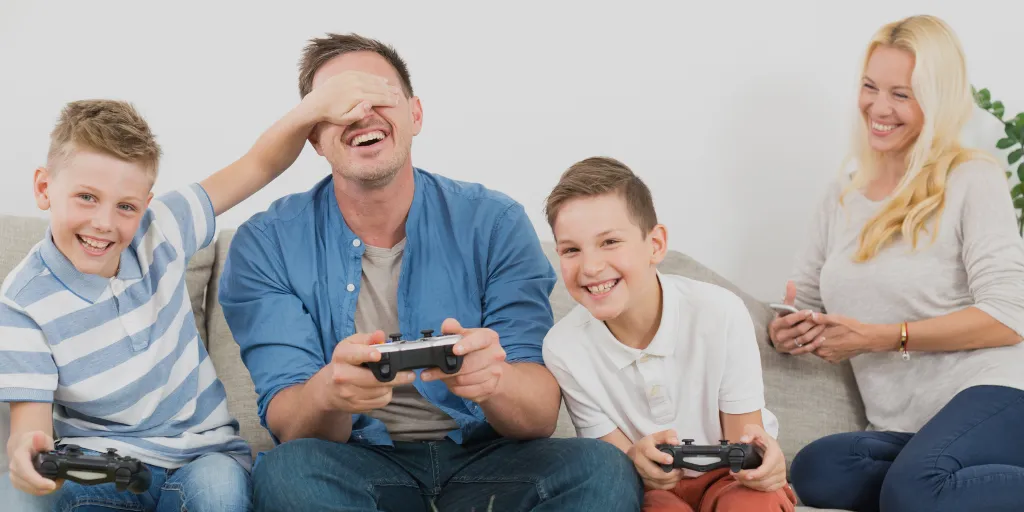You are what you click!
Learn how to make cybersecurity your way of life in an easy and guided way.
You are what you click!
Become Cyber savvy
EXPLORE BLOG BELOW
You are what you click!
Become Cyber savvy
You are what you click!
Become Cyber savvy
You are what you click!
Become Cyber savvy

Gaming Guardians: Leveling Up Your Family's Online Play Safety
Gaming Guardians: Leveling Up Your Family's Online Play Safety
In a world where digital landscapes are as familiar to children as their own backyards, online gaming has become a vibrant, immersive playground. With its virtual worlds and real-time interactions, it offers unparalleled entertainment and social connectivity. However, like any frontier, it comes with its share of perils. As parents and guardians, our role extends beyond simply providing access to these digital realms; we must become gaming guardians, equipped to navigate the complex terrain of online safety.
The Double-Edged Sword of Online Gaming
The allure of online gaming is undeniable. It provides a platform for creativity, problem-solving, and social interaction that can be both entertaining and educational. Children can forge friendships across continents, collaborate on complex tasks, and develop digital literacy skills essential for the 21st century. Yet, this digital utopia is not without its shadows. The very features that make online gaming so engaging—anonymity, global reach, and instant communication—also harbor potential threats to our children's well-being.
Navigating the Minefield: Common Threats in Online Gaming
Understanding the risks is the first step in safeguarding our children. Cyberbullying, perhaps the most pervasive threat, takes on new dimensions in gaming environments. The competitive nature of many games can exacerbate toxic behavior, with trash talk escalating to sustained harassment. Unlike traditional bullying, cyberbullying in games can follow children into their homes, persisting across different platforms and times of day.
A Real Story: Take, for example, the case of a young gamer named Jack. Jack enjoyed playing online games after school, but he began to dread logging on due to relentless bullying from other players. They mocked his skills and even created derogatory memes about him. The constant harassment affected his self-esteem and academic performance. Jack's parents intervened by discussing the issue with him and reporting the bullies to the gaming platform, eventually restoring a sense of safety and enjoyment in his gaming experience.
More insidious are the predators who view gaming platforms as hunting grounds. These individuals may exploit the trust and camaraderie fostered in gaming communities to groom unsuspecting children. They might use in-game chats or private messaging features to establish rapport, gradually steering conversations towards personal topics or attempting to arrange real-world meetings.
Inappropriate content presents another significant concern. While many games have age ratings, the user-generated content within them—including custom character skins, mods, or player-to-player communications—can introduce mature themes, violence, or explicit material that bypasses official content filters.

Fortifying the Digital Ramparts: Setting Up Parental Controls
Parental controls serve as the first line of defense in our arsenal of digital safety tools. Most gaming platforms, from consoles like PlayStation and Xbox to PC platforms such as Steam, offer robust parental control features. These allow parents to restrict access to certain games based on age ratings, limit online interactions, and control in-game purchases.
To implement these safeguards effectively:
Familiarize yourself with the specific parental control options for each gaming device or platform your child uses.
Create separate user accounts for each child, with age-appropriate restrictions.
Set up two-factor authentication on all gaming accounts to prevent unauthorized access.
Regularly review and update these settings as your child matures and their gaming habits evolve.
Remember, parental controls are not infallible. They should be viewed as part of a comprehensive approach to online safety, not a substitute for parental engagement and open communication.
Equipping Young Knights: Teaching Kids About Safe Online Behavior
While technological safeguards are crucial, the most powerful tool in ensuring online safety is education. Teaching children to recognize and respond to potential threats empowers them to navigate the digital world confidently and responsibly.
Key lessons to impart include:
The importance of protecting personal information, including never sharing real names, addresses, or school details with online acquaintances.
How to recognize manipulation tactics used by predators, such as excessive flattery or attempts to isolate them from friends and family.
The permanence of online actions and the potential real-world consequences of digital behavior.
Strategies for dealing with cyberbullying, including blocking offenders, saving evidence, and seeking help from trusted adults.
The concept of digital citizenship and the responsibility to contribute positively to online communities.
These conversations should be ongoing, evolving as children grow and encounter new online experiences. Use real-world examples and hypothetical scenarios to make the lessons tangible and relevant.

Vigilant Overwatch: Monitoring Game Chat and Friend Requests
Active monitoring of your child's online interactions is a delicate balance between ensuring safety and respecting privacy. While constant surveillance can erode trust, periodic check-ins and open discussions about online experiences are crucial.
Consider implementing the following strategies:
Regularly review your child's friends list and discuss how they know each person.
Occasionally observe gameplay sessions, paying attention to the nature of in-game chat.
Establish ground rules for accepting friend requests and joining new online communities.
Encourage your child to share any uncomfortable or suspicious interactions they encounter.
The goal is not to police every interaction but to foster an environment where your child feels comfortable discussing their online experiences with you.
Maintaining Balance: Gaming Time vs. Real-World Activities
While not inherently harmful, excessive gaming can lead to neglect of other important aspects of life, including physical health, academic performance, and face-to-face social interactions. Establishing a healthy balance is crucial for overall well-being.
Consider implementing a family media plan that includes:
Set gaming time limits that still allow for enjoyment but don't dominate leisure time.
Designate tech-free zones and times, such as during meals or an hour before bedtime.
Encourage participation in physical activities and non-digital hobbies.
Model healthy technology use habits yourself.
Remember that balance looks different for every family. The key is to find a rhythm that works for your household while ensuring that gaming enhances rather than detracts from overall quality of life.
Red Flags on the Horizon: Recognizing Signs of Online Gaming Addiction
While gaming addiction is not universally recognized as a formal disorder, excessive gaming can lead to behavioral patterns that mirror addiction. Being aware of the warning signs can help parents intervene early if gaming begins to negatively impact a child's life.
Watch for the following indicators:
Preoccupation with gaming to the exclusion of other activities
Irritability, anxiety, or depression when unable to play
Neglect of personal hygiene or basic needs
Declining academic performance or loss of interest in previously enjoyed activities
Lying about or hiding the extent of gaming activities
Using gaming as a primary coping mechanism for stress or negative emotions
Fact to Highlight: According to the World Health Organization, "Gaming Disorder" is characterized by impaired control over gaming, increasing priority given to gaming over other activities, and continuation or escalation of gaming despite negative consequences. Early intervention can help mitigate these issues and promote healthier gaming habits.
Conclusion: Empowering Families to Game Safely
As we navigate the ever-evolving landscape of online gaming, our role as parents and guardians is not to erect impenetrable walls but to equip our children with the tools and knowledge they need to explore safely. By implementing technological safeguards, fostering open communication, and modeling healthy digital habits, we can create an environment where the benefits of online gaming can be enjoyed without falling prey to its potential pitfalls.
Remember, the goal is not to instill fear but to empower. With the right approach, online gaming can be a source of joy, learning, and connection for the entire family. As gaming guardians, we have the power to shape our children's digital experiences, ensuring that their online adventures are as safe as they are exciting.
In this digital age, let us embrace our role as not just parents, but as guides and fellow explorers in the vast, vibrant world of online gaming. Together, we can level up our families' online safety, ensuring that the next generation of gamers is not only skilled at play but wise in navigating the digital world.
Live Happily Ever Cyber!

Sandra Estok
Subscribe for more ways to protect what matters most to you against hackers, scammers, and Cybermonsters™
Latest blog posts:

Gaming Guardians: Leveling Up Your Family's Online Play Safety
Gaming Guardians: Leveling Up Your Family's Online Play Safety
In a world where digital landscapes are as familiar to children as their own backyards, online gaming has become a vibrant, immersive playground. With its virtual worlds and real-time interactions, it offers unparalleled entertainment and social connectivity. However, like any frontier, it comes with its share of perils. As parents and guardians, our role extends beyond simply providing access to these digital realms; we must become gaming guardians, equipped to navigate the complex terrain of online safety.
The Double-Edged Sword of Online Gaming
The allure of online gaming is undeniable. It provides a platform for creativity, problem-solving, and social interaction that can be both entertaining and educational. Children can forge friendships across continents, collaborate on complex tasks, and develop digital literacy skills essential for the 21st century. Yet, this digital utopia is not without its shadows. The very features that make online gaming so engaging—anonymity, global reach, and instant communication—also harbor potential threats to our children's well-being.
Navigating the Minefield: Common Threats in Online Gaming
Understanding the risks is the first step in safeguarding our children. Cyberbullying, perhaps the most pervasive threat, takes on new dimensions in gaming environments. The competitive nature of many games can exacerbate toxic behavior, with trash talk escalating to sustained harassment. Unlike traditional bullying, cyberbullying in games can follow children into their homes, persisting across different platforms and times of day.
A Real Story: Take, for example, the case of a young gamer named Jack. Jack enjoyed playing online games after school, but he began to dread logging on due to relentless bullying from other players. They mocked his skills and even created derogatory memes about him. The constant harassment affected his self-esteem and academic performance. Jack's parents intervened by discussing the issue with him and reporting the bullies to the gaming platform, eventually restoring a sense of safety and enjoyment in his gaming experience.
More insidious are the predators who view gaming platforms as hunting grounds. These individuals may exploit the trust and camaraderie fostered in gaming communities to groom unsuspecting children. They might use in-game chats or private messaging features to establish rapport, gradually steering conversations towards personal topics or attempting to arrange real-world meetings.
Inappropriate content presents another significant concern. While many games have age ratings, the user-generated content within them—including custom character skins, mods, or player-to-player communications—can introduce mature themes, violence, or explicit material that bypasses official content filters.

Fortifying the Digital Ramparts: Setting Up Parental Controls
Parental controls serve as the first line of defense in our arsenal of digital safety tools. Most gaming platforms, from consoles like PlayStation and Xbox to PC platforms such as Steam, offer robust parental control features. These allow parents to restrict access to certain games based on age ratings, limit online interactions, and control in-game purchases.
To implement these safeguards effectively:
Familiarize yourself with the specific parental control options for each gaming device or platform your child uses.
Create separate user accounts for each child, with age-appropriate restrictions.
Set up two-factor authentication on all gaming accounts to prevent unauthorized access.
Regularly review and update these settings as your child matures and their gaming habits evolve.
Remember, parental controls are not infallible. They should be viewed as part of a comprehensive approach to online safety, not a substitute for parental engagement and open communication.
Equipping Young Knights: Teaching Kids About Safe Online Behavior
While technological safeguards are crucial, the most powerful tool in ensuring online safety is education. Teaching children to recognize and respond to potential threats empowers them to navigate the digital world confidently and responsibly.
Key lessons to impart include:
The importance of protecting personal information, including never sharing real names, addresses, or school details with online acquaintances.
How to recognize manipulation tactics used by predators, such as excessive flattery or attempts to isolate them from friends and family.
The permanence of online actions and the potential real-world consequences of digital behavior.
Strategies for dealing with cyberbullying, including blocking offenders, saving evidence, and seeking help from trusted adults.
The concept of digital citizenship and the responsibility to contribute positively to online communities.
These conversations should be ongoing, evolving as children grow and encounter new online experiences. Use real-world examples and hypothetical scenarios to make the lessons tangible and relevant.

Vigilant Overwatch: Monitoring Game Chat and Friend Requests
Active monitoring of your child's online interactions is a delicate balance between ensuring safety and respecting privacy. While constant surveillance can erode trust, periodic check-ins and open discussions about online experiences are crucial.
Consider implementing the following strategies:
Regularly review your child's friends list and discuss how they know each person.
Occasionally observe gameplay sessions, paying attention to the nature of in-game chat.
Establish ground rules for accepting friend requests and joining new online communities.
Encourage your child to share any uncomfortable or suspicious interactions they encounter.
The goal is not to police every interaction but to foster an environment where your child feels comfortable discussing their online experiences with you.
Maintaining Balance: Gaming Time vs. Real-World Activities
While not inherently harmful, excessive gaming can lead to neglect of other important aspects of life, including physical health, academic performance, and face-to-face social interactions. Establishing a healthy balance is crucial for overall well-being.
Consider implementing a family media plan that includes:
Set gaming time limits that still allow for enjoyment but don't dominate leisure time.
Designate tech-free zones and times, such as during meals or an hour before bedtime.
Encourage participation in physical activities and non-digital hobbies.
Model healthy technology use habits yourself.
Remember that balance looks different for every family. The key is to find a rhythm that works for your household while ensuring that gaming enhances rather than detracts from overall quality of life.
Red Flags on the Horizon: Recognizing Signs of Online Gaming Addiction
While gaming addiction is not universally recognized as a formal disorder, excessive gaming can lead to behavioral patterns that mirror addiction. Being aware of the warning signs can help parents intervene early if gaming begins to negatively impact a child's life.
Watch for the following indicators:
Preoccupation with gaming to the exclusion of other activities
Irritability, anxiety, or depression when unable to play
Neglect of personal hygiene or basic needs
Declining academic performance or loss of interest in previously enjoyed activities
Lying about or hiding the extent of gaming activities
Using gaming as a primary coping mechanism for stress or negative emotions
Fact to Highlight: According to the World Health Organization, "Gaming Disorder" is characterized by impaired control over gaming, increasing priority given to gaming over other activities, and continuation or escalation of gaming despite negative consequences. Early intervention can help mitigate these issues and promote healthier gaming habits.
Conclusion: Empowering Families to Game Safely
As we navigate the ever-evolving landscape of online gaming, our role as parents and guardians is not to erect impenetrable walls but to equip our children with the tools and knowledge they need to explore safely. By implementing technological safeguards, fostering open communication, and modeling healthy digital habits, we can create an environment where the benefits of online gaming can be enjoyed without falling prey to its potential pitfalls.
Remember, the goal is not to instill fear but to empower. With the right approach, online gaming can be a source of joy, learning, and connection for the entire family. As gaming guardians, we have the power to shape our children's digital experiences, ensuring that their online adventures are as safe as they are exciting.
In this digital age, let us embrace our role as not just parents, but as guides and fellow explorers in the vast, vibrant world of online gaming. Together, we can level up our families' online safety, ensuring that the next generation of gamers is not only skilled at play but wise in navigating the digital world.
Live Happily Ever Cyber!

Sandra Estok
Subscribe for more ways to protect what matters most to you against hackers, scammers, and Cybermonsters™
Stop Hackers, Scammers and Cybermonsters in their tracks.
Take charge of your Cyber Life today!
Push Cybermonsters away from your private data.
Subscribe to my newsletter about cybersecurity and cyber safety. New issues every Tuesday.




